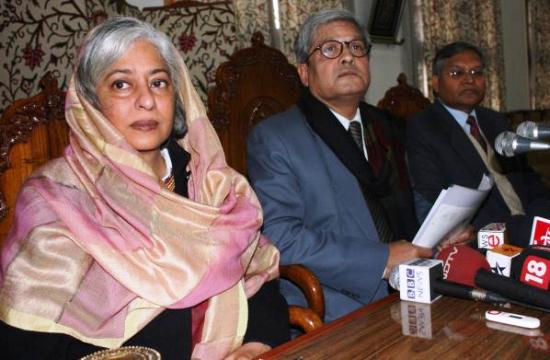
by Shujaat Bukhari
The much-awaited report by Government of India (GoI) appointed interlocutors has raised more suspicion about New Delhi’s seriousness towards resolving the issue of Jammu and Kashmir.
Their report is comprehensive and carries the views of a cross section of people with diverse ideologies. They interacted with more than 6000 people, who were more concerned about problems of governance, economic upliftment, share in services and better amenities, but it could not engage those who challenge the state’s accession to India.
They also held discussions with traditional mainstream set up comprising the electoral players. All these parties have been in one way or the other part of the establishment and have enjoyed power. They don’t have any problems with the basic political relationship between Srinagar and New Delhi.
Unsurprisingly, the trio has now suggested that GOI should open the doors of talks with separatists. So, what was their mandate? Did they move an inch towards creating an atmosphere for such a process? If any such insight was expected from the trio, that is missing.
The Compact, as they have titled their report and which would mean a “negotiated settlement”, does not give a final word or roadmap for settlement. Have they really negotiated with all the stakeholders?
If the mandate given to interlocutors by Cabinet Committee on Security is any basis for this process, the group had to find a solution. It has suggested a constitutional committee for examining central laws extended to state. So the people of Jammu and Kashmir have to again petition before such a committee rather than the government coming on its own and asking them about their political demands are.
What has happened in the state in general in the last 21 years and in Kashmir in particular is an open book. But the interlocutors have ignored human rights violations.
Ignoring the dominant political aspirations of people, the group is more interested in putting the regions of the state at loggerheads. They have made a dangerous suggestion of setting up regional councils, which obviously would further divide the state on communal lines. The much talked about “competitive victimhood” is a dangerous preposition the interlocutors have tried to fit in the political discourse on Jammu and Kashmir.
If the regional council were meant for the development of the regions, then the areas like Rajouri-Poonch and Doda also deserve such councils keeping in view their backwardness vis-a-vis other districts of Jammu region.
These suggestions tantamount to reinforcing the two-nation theory in Jammu and Kashmir. Even Justice Saghir Ahmad, who headed Prime Minister’s Working Group on Centre-State relations, had emphatically opposed the idea steering clear of trifurcation—the agenda pursued by RSS.
Some productive suggestions to bridge the gaps and remove mistrust notwithstanding, the report lacks a cohesive political vision for a lasting solution. The major crisis the interlocutors confronted is the credibility of such exercises in the past. The ‘Compact’ is the 11th such report in last six years with little implementation.
Finally, it is amusing to hear Dileep Padgaonkar say he would continue to engage with separatists. In what capacity and whose mandate? There has been no such committee in the past that would continue working the mandate expired. When they could not break the ice with separatists while being official interlocutors, what can private exercise achieve? It is better for them to engage with GOI, pursue their recommendations, create an atmosphere and help building trust and confidence towards such a process.
(Bukhari is the chief editor of daily newspaper Rising Kashmir)















